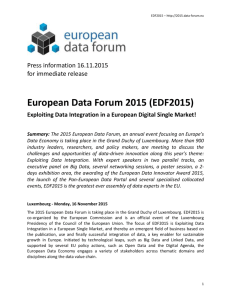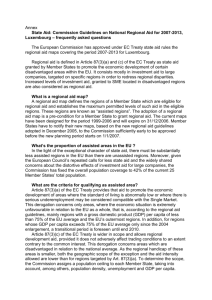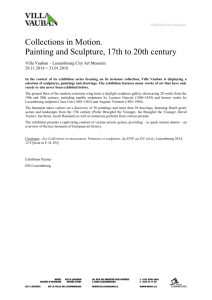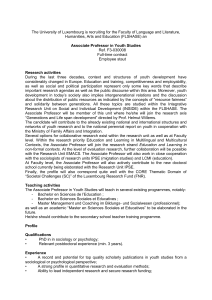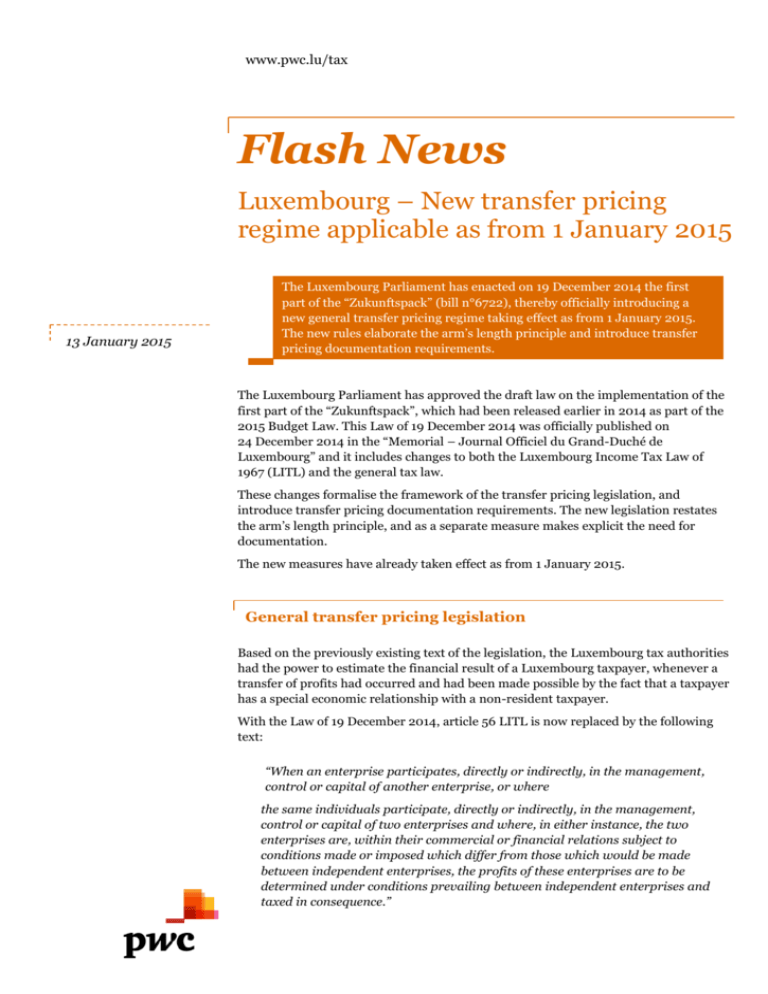
www.pwc.lu/tax
Flash News
Luxembourg – New transfer pricing
regime applicable as from 1 January 2015
13 January 2015
The Luxembourg Parliament has enacted on 19 December 2014 the first
part of the “Zukunftspack” (bill n°6722), thereby officially introducing a
new general transfer pricing regime taking effect as from 1 January 2015.
The new rules elaborate the arm’s length principle and introduce transfer
pricing documentation requirements.
The Luxembourg Parliament has approved the draft law on the implementation of the
first part of the “Zukunftspack”, which had been released earlier in 2014 as part of the
2015 Budget Law. This Law of 19 December 2014 was officially published on
24 December 2014 in the “Memorial – Journal Officiel du Grand-Duché de
Luxembourg” and it includes changes to both the Luxembourg Income Tax Law of
1967 (LITL) and the general tax law.
These changes formalise the framework of the transfer pricing legislation, and
introduce transfer pricing documentation requirements. The new legislation restates
the arm’s length principle, and as a separate measure makes explicit the need for
documentation.
The new measures have already taken effect as from 1 January 2015.
General transfer pricing legislation
Based on the previously existing text of the legislation, the Luxembourg tax authorities
had the power to estimate the financial result of a Luxembourg taxpayer, whenever a
transfer of profits had occurred and had been made possible by the fact that a taxpayer
has a special economic relationship with a non-resident taxpayer.
With the Law of 19 December 2014, article 56 LITL is now replaced by the following
text:
“When an enterprise participates, directly or indirectly, in the management,
control or capital of another enterprise, or where
the same individuals participate, directly or indirectly, in the management,
control or capital of two enterprises and where, in either instance, the two
enterprises are, within their commercial or financial relations subject to
conditions made or imposed which differ from those which would be made
between independent enterprises, the profits of these enterprises are to be
determined under conditions prevailing between independent enterprises and
taxed in consequence.”
Whereas under the previously existing law, the concept of related parties was broadly
defined (i.e. any special economic relationship), the new text outlining the arm’s length
principle becomes aligned with the OECD Tax Model Convention. One consequence is
that the arm’s length principle is, as from 1 January 2015, to be applied to transactions
between two related entities both located in Luxembourg, as well as where one party is
taxed in a foreign jurisdiction.
Moreover, the new text obliges the taxpayer to report in its tax return either an upward
or downward adjustment of profits whenever transfer prices do not reflect the arm’s
length principle.
Although not explicitly provided in the new legislation, it should still be expected that
some of the many questions concerning the practical aspects of the new legislation will
be further detailed by way of Grand-Ducal Regulations or Administrative Circulars.
Documentation
In the past, Luxembourg tax legislation did not contain specific or express provisions
governing transfer pricing documentation. Nevertheless, taxpayers did already have an
obligation under the general tax law to be able to support the data included in their tax
return.
The Law of 19 December 2014 introduced a new subparagraph in paragraph 171 of the
general tax law that makes this obligation explicit in the context of transfer price
setting, by providing that the existing law “shall apply accordingly to transactions
between related parties”. This new subparagraph hence clarifies that, as from
1 January 2015, normal disclosure and documentation requirements also apply to
transactions between related parties.
The Luxembourg tax authorities may request from the taxpayer all facts relevant for
verifying a tax liability. For this purpose, the taxpayer is required to provide all
necessary supporting documentation to facilitate the task of the Luxembourg tax
authorities. The new subparagraph makes it clear that this obligation to provide
documentation is now applicable when the Luxembourg tax authorities are seeking to
verify transfer prices.
One consequence of this change is that, whenever the Luxembourg tax authorities have
reason to consider that a transfer of profits might have occurred (because the
transaction under analysis does not comply with the arm’s length principle) and the
facts are not made clear or documented by the taxpayer, the Luxembourg tax
authorities may look to the underlying economic reality of the operations and presume
that there has been an undue reduction in profits, without having to justify this exactly.
Hence, the absence of proper transfer pricing documentation could result in a reversal
of the burden of proof towards the taxpayer.
No explicit documentation requirements are imposed by the Law of 19 December 2014.
The nature and extent of the documentation needed depends on the circumstances of
the case under consideration. The expectation of the level of documentation needed
should be lower for straightforward corporate transactions, or for those undertaken by
small businesses.
Lastly, the Commentary on the text of the Bill has already pointed out that Chapter V
of the OECD Transfer Pricing Guidelines – referred to in the Commentary as being the
“directing principles relating to documentation” – are being revised. Hence, once the
revision of Chapter V is completed Luxembourg will expect taxpayers to apply the
“three-tiered” approach to documentation, which will include the Country-by-Country
Report obligations, deriving from Action Point 13 of the OECD’s BEPS Action Plan.
Advance Pricing Agreements (APAs)
Another component of the Law of 19 December 2014 does not specifically concern
transfer pricing, but is highly relevant. For all aspects of the direct tax system, a revised
and unified system for all advance tax confirmations came into force. The new system
includes any form of APAs. The aim remains to provide taxpayers with legal certainty
for their transactions, while offering a uniform and egalitarian treatment between
taxpayers and, importantly, increasing the transparency of the Luxembourg tax
system. Fees, varying from EUR 3,000 to EUR 10,000 depending on the complexity of
the matter, apply as from 1 January 2015 to cover the administrative and operational
expenses of the tax administration in reviewing advance tax confirmation requests.
The procedure for requesting any advance tax confirmation has already been further
detailed in a Grand-Ducal Regulation dated 23 December 2014. The Grand-Ducal
Regulation clarifies that the competent tax authority will now have to seek advice for
advance tax confirmations from a tax rulings commission, the “Commission des
decisions anticipées”, which will guarantee a uniform and egalitarian treatment
between taxpayers. All advance tax confirmations given are to be published in a
summarised way and anonymously in the annual report of activities of the
Luxembourg direct tax authorities.
Finally, the administrative fees are due and fully payable within one month following
confirmation by the tax authorities of the amount to be charged, following their initial
review of the advance tax confirmation request. The advance tax confirmation sought
will be issued only after receipt of the payment. The payment is non-reimbursable,
even when the request is withdrawn by the taxpayer or if a negative decision has been
reached.
Conclusions
The new legislation should be seen as an extension and clarification of the previously
existing tax law, including as from now on an explicit application within Luxembourg
of the OECD concepts of transfer pricing.
In view of the attention and resourcing now increasingly being given to transfer pricing
matters by the Luxembourg tax authorities, all Luxembourg taxpayers should ensure
that their transfer prices are consistent with the arm’s length principle, and are
supported by sound transfer pricing documentation.
For more information, please contact us:
…………………………………………………………………………………………………………………….
Wim Piot
Partner
+352 49 48 48 3052
wim.piot@lu.pwc.com
Caroline Goemaere
Partner
+352 49 48 48 3002
caroline.goemaere@lu.pwc.com
Marc Rasch
Partner
+352 49 48 48 3712
marc.rasch@lu.pwc.com
…………………………………………………………………………………………………………………….
…………………………………………………………………………………………………………………….
…………………………………………………………………………………………………………………….
PwC Luxembourg (www.pwc.lu) is the largest professional services firm in Luxembourg with 2,450 people employed from 55 different countries. It
provides audit, tax and advisory services including management consulting, transaction, financing and regulatory advice to a wide variety of clients from
local and middle market entrepreneurs to large multinational companies operating from Luxembourg and the Greater Region. It helps its clients create
the value they are looking for by giving comfort to the capital markets and providing advice through an industry focused approach.
The global PwC network is the largest provider of professional services in audit, tax and advisory. We’re a network of independent firms in 157 countries
and employ more than 184,000 people. Tell us what matters to you and find out more by visiting us at www.pwc.com and www.pwc.lu.
© 2015 PricewaterhouseCoopers, Société coopérative. All rights reserved. In this document, “PwC Luxembourg” refers to PricewaterhouseCoopers,
Société coopérative (Luxembourg) which is a member firm of PricewaterhouseCoopers International Limited (“PwC IL”), each member firm of which is a
separate and independent legal entity. PwC IL cannot be held liable in any way for the acts or omissions of its member firms.

